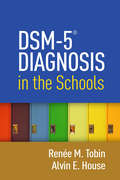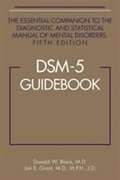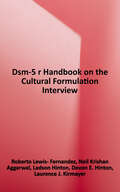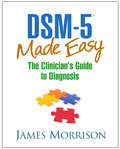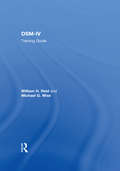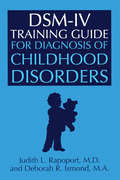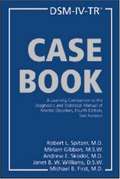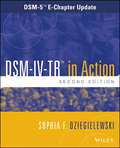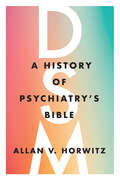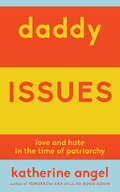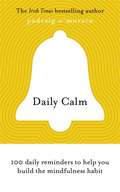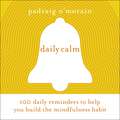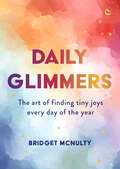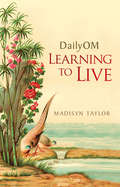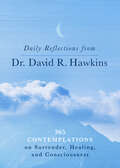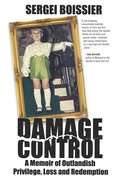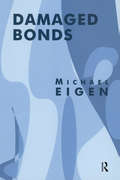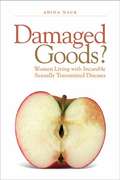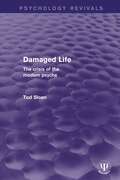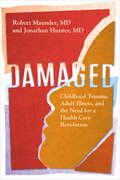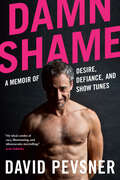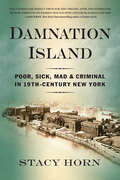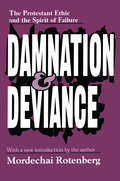- Table View
- List View
DSM-5® Diagnosis in the Schools
by Alvin E. House Renée M. TobinThousands of practitioners using prior editions of the DSM have relied on this key resource to optimize their diagnostic practices in PreK-12 settings. Now significantly revised for DSM-5, the book cuts through the overwhelming length and complexity of the diagnostic manual by focusing thematically on the most common child and adolescent concerns. Tips are provided for diagnostic decision making and coding, and technical terms are demystified. Emphasis is given to using diagnosis as a foundation for effective intervention. The book highlights links to special education eligibility under IDEA and discusses ethical and professional issues in school-based assessment. New to This Edition *Revised throughout for DSM-5. *Restructured chapters on learning, communication, and motor problems; mood problems; anxiety problems; conduct problems; and impulse-control problems. *Updated content on IDEA 2004. *Notes encapsulating changes to each set of diagnostic criteria, for those familiar with the prior DSM. *Author Commentary sidebars sharing clinical insights and experiences.
DSM-5® Guidebook: The Essential Companion To The Diagnostic And Statistical Manual Of Mental Disorders
by Donald Black Jon GrantDSM-5® Guidebook: The Essential Companion to the Diagnostic and Statistical Manual of Mental Disorders, Fifth Edition is a user-friendly, supplementary guide for psychiatrists, psychologists, and other mental health practitioners who need to know how DSM-5® differs from its predecessor in terms of organizational structure, diagnostic categories, and the criteria themselves. While it does not replace the comprehensive and authoritative DSM-5®, it illuminates its content by teaching mental health professionals how to use the revised diagnostic criteria and by providing a practical context for its clinical use. <p>p> DSM-5® Guidebook provides a roadmap to the many changes in this living document, DSM-5®, and will prove invaluable to psychiatrists, psychologists, psychiatric nurses, neurologists, social workers, and all who strive to understand mental illness as it is conceived today.
DSM-5® Handbook on the Cultural Formulation Interview
by Roberto Lewis-Fernández Devon E. Hinton Laurence J. Kirmayer Ladson Hinton Neil Krishan AggarwalDSM-5(R) Handbook of the Cultural Formulation Interview provides the background, context, and detailed guidance necessary to train clinicians in the use of the Cultural Formulation Interview (CFI), which was created as part of the 2007-2013 DSM revision process. The purpose of the CFI -- and this unique handbook -- is to make it easier for providers to account for the influence of culture in their clinical work to enhance patient-clinician communication and improve outcomes. Cultural psychiatry as a field has evolved enormously from the days when it was principally concerned with epidemiological and clinical studies of disease prevalence; it now examines a multitude of issues, primary among them the differing patient, family, and practitioner models of illness and treatment experiences within and across cultures. <p><p>The editors, all of whom have been intimately involved in the evolution of the field, have designed the book and accompanying videos for maximum instructional and clinical utility. The Handbook boasts many strengths and useful features, including: * A detailed description of each of the three CFI components: a core 16-item questionnaire, which can be applied in any clinical setting with any patient by any mental health clinician; an informant version of the core CFI used to obtain information from caregivers; and 12 supplementary modules that expand on these basic assessments. This material facilitates the implementation of the CFI by clinicians.* Over a dozen clinical vignettes are included to illustrate use of the three components, and the Handbook also includes multiple videos that demonstrate the application of portions of the core CFI, and several supplementary modules.* Strategies for incorporating the CFI into clinical training are identified and discussed, furthering the objective of developing culturally-sensitive and astute practitioners.* <p><p>The theoretical bases of the CFI are explored, raising questions for discussion and identifying areas for further research. The CFI is a valuable tool for all patients, not just those judged to be culturally different. The CFI has been called the single most practically useful contribution of cultural psychiatry and medical anthropology to clinical psychiatry, primary care, and medicine in general. DSM-5(R) Handbook on the Cultural Formulation Interview is the only book on the market that equips readers with the skills and insight to incorporate the CFI into practice, making it a critically important addition to the clinical literature.
DSM-5® Made Easy: The Clinician's Guide to Diagnosis
by James MorrisonIn this indispensable book, master diagnostician James Morrison presents the spectrum of diagnoses in DSM-5 in an accessible, engaging, clinically useful format. Demystifying DSM-5 criteria without sacrificing accuracy, the book includes both ICD-10-CM and ICD-9-CM codes for each disorder. It also includes the Global Assessment of Functioning (GAF) Scale (from DSM-IV-TR), with a clear rationale for its continued use. More than 130 detailed case vignettes illustrate typical patient presentations; down-to-earth discussions of each case demonstrate how to arrive at the diagnosis and rule out other likely possibilities. Providing a wealth of diagnostic pointers, Morrison writes with the wisdom and wit that made his guide to the prior DSM a valued resource for hundreds of thousands of clinicians. His website (www.guilford.com/jm) offers additional discussion and resources related to psychiatric diagnosis and DSM-5.
DSM-IV Made Easy: The Clinician's Guide to Diagnosis
by James MorrisonThis book takes the reader through a step-by-step diagnostic process for every DSM-IV category, and explains how to derive a complete five-axis diagnosis. Each set of criteria is discussed in detail, illustrated by vivid clinical vignettes and interpreted in lucid terms.
DSM-IV Training Guide
by William H. Reid Michael G. WiseFirst published in 1995. Following on from two previous books that focused on the treatment of the DSM-III and DSM-III-R psychiatric disorders. This book is devoted to training clinicians on the proper use of the DSM and offers a great contribution to the education of mental health professionals. Written by experts in forensic psychiatry and medical education this is a clear and comprehensiveness DSM -IV Training Guide.
DSM-IV Training Guide For Diagnosis Of Childhood Disorders
by Judith L. Rapoport Deborah R. IsmondFirst published in 1996. Routledge is an imprint of Taylor & Francis, an informa company.
DSM-IV-TR Casebook
by Michael B. First Andrew E. Skodol Janet B. W. Williams Robert L. SpitzerThis casebook for students, clinicians, and related professionals presents a selection of real clinical vignettes which illustrate the concepts and terminology found in the DSM-IV-TR. These accounts have been edited to focus on information relevant to differential diagnosis. The cases are organized into sections on adults, children and adolescents, multiaxial assessment, international cases, and historical cases. They are also indexed by diagnosis and by special interest (i.e. in the medical setting). Each case is followed by a discussion of the DSM-IV-TR differential diagnosis. The editors are with the psychiatry department at Columbia University. Annotation c. Book News, Inc., Portland, OR (booknews.com)
DSM-IV-TR in Action: DSM-5 E-Chapter Update
by Sophia F. DziegielewskiThe DSM-5 E-chapter Update bridges the gap between the DSM-IV-TR and the DSM-5. This chapter outlines the changes in the DSM-5 while using the original treatment information from the second edition of the book. The DSM-5 E-chapter Update allows the current information to be used to support the practitioner with current application principles relating psychopathology to clinical mental health practice. This chapter allows instructors to be able to use and transition to the DSM-5 while still teaching the DSM-IV-TR. What makes this “in action” text unique is that it not only breaks down the criteria for the diagnostic categories but it helps the practitioner directly apply it. The DSM-5 E-chapter Update will follow a similar format as the treatment outlined in the current edition is still quite valuable and should not change much with the full book revision. The chapter provides a bridge to the information still relevant and current in the book such as the application of the diagnostic assessment found in today's behavioral-based biopsychosocial field of practice. This chapter includes the DSM-5 categories that correspond to each chapter in the second edition. Since instructors and practitioners alike, will need the information in the DSM-IV-TR and DSM-5 for a short time knowledge and application of both books will be essential. The existing cases and applications will remain helpful. What remains unique about this chapter is that it will allow for the joining of the second edition with the new changes in the DSM-5. The teacher and practitioner will be able to synthesize the information from both versions of the DSM to complete a diagnostic assessment that goes beyond the DSM-5 including current evidence and competency-based skill development in the resulting practice strategy.
DSM: A History of Psychiatry's Bible
by Allan V. HorwitzThe first comprehensive history of "psychiatry's bible"—the Diagnostic and Statistical Manual of Mental Disorders.Over the past seventy years, the Diagnostic and Statistical Manual of Mental Disorders, or DSM, has evolved from a virtually unknown and little-used pamphlet to an imposing and comprehensive compendium of mental disorder. Its nearly 300 conditions have become the touchstones for the diagnoses that patients receive, students are taught, researchers study, insurers reimburse, and drug companies promote. Although the manual is portrayed as an authoritative corpus of psychiatric knowledge, it is a product of intense political conflicts, dissension, and factionalism. The manual results from struggles among psychiatric researchers and clinicians, different mental health professions, and a variety of patient, familial, feminist, gay, and veterans' interest groups. The DSM is fundamentally a social document that both reflects and shapes the professional, economic, and cultural forces associated with its use.In DSM, Allan V. Horwitz examines how the manual, known colloquially as "psychiatry's bible," has been at the center of thinking about mental health in the United States since its original publication in 1952. The first book to examine its entire history, this volume draws on both archival sources and the literature on modern psychiatry to show how the history of the DSM is more a story of the growing social importance of psychiatric diagnoses than of increasing knowledge about the nature of mental disorder. Despite attempts to replace it, Horwitz argues that the DSM persists because its diagnostic entities are closely intertwined with too many interests that benefit from them. This comprehensive treatment should appeal to not only specialists but also anyone who is interested in how diagnoses of mental illness have evolved over the past seven decades—from unwanted and often imposed labels to resources that lead to valued mental health treatments and social services.
Daddy Issues: Love and Hate in the Time of Patriarchy
by Katherine AngelOn the fraught bonds between daughters and their fathers, women and the patriarchywomen patriarchy In this beguiling, incisive book, critically acclaimed writer Katherine Angel examines the place of fathers in contemporary culture with her characteristic mix of boldness and nuance, asking how the mixture of love and hatred we feel toward our fathers—and patriarchal father figures—can be turned into a relationship that is generative rather than destructive. Moving deftly between psychoanalysis from Freud to Winnicott, cultural visions of fathering from King Lear to Ivanka Trump, and issues from incest to MeToo, Angel probes the fraught bond of daughters and fathers, women and the patriarchal regime. What, she asks, is this discomfiting space of love and hate—and how are we to reckon with both fealty and rebellion? As in her earlier book Tomorrow Sex Will Be Good Again, Angel proves herself to be one of the most perceptive feminist writers at work today.
Daily Calm: 100 daily reminders to help you build the mindfulness habit
by Padraig O'MorainBuild a positive mindfulness habit with Daily Calm.The Daily Bell is a mindfulness reminder - a sort of 'thought of the day' - that mindfulness expert Padraig O'Morain sends out to his 15,000 subscribers every morning, and he has done so for the last 5 years.Following on from the success of this, Padraig has compiled 100 brand new reminders and easy exercises into Daily Calm. By picking up the book and dipping into the short exercises, you will learn to integrate mindfulness into your life, improve personal resilience and build up a regular mindfulness habit.As a psychotherapist, trained counsellor and mindfulness teacher with over 25 years' experience, Padraig understands the importance of taking time out of your busy day to find moments of calm.'Padraig is extremely well read and his knowledge of the subject of mindfulness is vast. He has a great ability to explain concepts in simple terms. This book will be a valuable addition to my own practice, and to my work as a psychologist in elite sport.'- Dr Kate Kirby, Olympic sport psychologist and Head of Psychology, Sport Ireland Institute'A plethora of practical and ingenious insights to help the most stressed amongst us to embrace the rewards of feeling calm. If you want to lead a calmer life, this book is for you. A very clever concept packed full of mindful solutions to help you cultivate inner tranquility in a chaotic world.'Fiona Brennan, clinical hypnotherapist and author of Irish Times bestseller, The Positive Habit'We need little moments and skills that can bring us from a state of overwhelm to one of calm, courageousness and compassion now, more than ever. Daily Calm will give you such moments and skills in simple, accessible, easily digestible chunks in a few short minutes per day. The practices within this book could change the trajectory of your day, and indeed your life when practiced consistently over time.'Aisling Leonard-Curtin, chartered psychologist, co-author No. 1 Irish Times bestseller, The Power of Small, Acceptance and Commitment Therapy Trainer
Daily Calm: 100 daily reminders to help you build the mindfulness habit
by Padraig O'MorainBuild a positive mindfulness habit with Daily Calm. <P><P>The Daily Bell is a mindfulness reminder - a sort of 'thought of the day' - that mindfulness expert Padraig O'Morain sends out to his 15,000 subscribers every morning, and he has done so for the last 5 years. <P><P>Following on from the success of this, Padraig has compiled 100 brand new reminders and easy exercises into Daily Calm. By picking up the book and dipping into the short exercises, you will learn to integrate mindfulness into your life, improve personal resilience and build up a regular mindfulness habit. <P><P>As a psychotherapist, trained counsellor and mindfulness teacher with over 25 years' experience, Padraig understands the importance of taking time out of your busy day to find moments of calm. <P><P>'Padraig is extremely well read and his knowledge of the subject of mindfulness is vast. He has a great ability to explain concepts in simple terms. This book will be a valuable addition to my own practice, and to my work as a psychologist in elite sport.'- Dr Kate Kirby, Olympic sport psychologist and Head of Psychology, Sport Ireland Institute' <P><P>A plethora of practical and ingenious insights to help the most stressed amongst us to embrace the rewards of feeling calm. If you want to lead a calmer life, this book is for you. A very clever concept packed full of mindful solutions to help you cultivate inner tranquility in a chaotic world.' <P><P>Fiona Brennan, clinical hypnotherapist and author of Irish Times bestseller, The Positive Habit' <P><P>We need little moments and skills that can bring us from a state of overwhelm to one of calm, courageousness and compassion now, more than ever. Daily Calm will give you such moments and skills in simple, accessible, easily digestible chunks in a few short minutes per day. The practices within this book could change the trajectory of your day, and indeed your life when practiced consistently over time. <P><P>'Aisling Leonard-Curtin, chartered psychologist, co-author No. 1 Irish Times bestseller, The Power of Small, Acceptance and Commitment Therapy Trainer
Daily Calm: 100 daily reminders to help you build the mindfulness habit
by Padraig O'MorainA book of 100 new quotes and exercises to help you build a positive mindfulness habit.Build a positive meditation habit with Daily Calm.The Daily Bell is a mindfulness reminder - a sort of 'thought of the day' - that mindfulness expert Padraig O'Morain sends out to his 15,000 subscribers every morning, and he has done so for the last 5 years. Following on from the success of this, Padraig has compiled 100 brand new bells and exercises into Daily Calm. By picking up the book and dipping into the short exercises, you will learn to integrate mindfulness into your life and build up a regular mindfulness habit.As a psychotherapist, trained counsellor and mindfulness teacher with over 25 years' experience, Padraig understands the importance of taking time out of your busy day to find moments of calm.(P) 2019 Hodder & Stoughton Ltd
Daily Glimmers: The art of finding tiny joys every day of the year
by Bridget McNultyThis beautiful pocket self-help book teaches us to notice three-second glimmers of joy every day, to build resilience and deal with difficult times.In difficult times it's easy to get lost in the darkness – but this beautiful pocket self-help book gives us the tools to find three-second glimmers of joy every day, to build our resilience and keep us going.Did you just taste something delicious? That was a glimmer. Notice the way the light slanted in through the window? That was a glimmer.Glimmers are easy to miss as they&’re so brief and fleeting, but they can help your mood shift, and lift. Finding them – uncovering them on the commute, or while doing the same-old daily routine – is an art and a skill. Looking for glimmers is a recognized mental health practice to enable you to deal with the darkest days.In this book, 12 thematic chapters each hold 30 or 31 beautiful glimmers plus two aligned alternatives, amounting to one entry for every day of the year – and more than 1,000 glimmers. Learn to notice micro-moments of joy such as putting on a pair of new socks, stroking a purring cat, popping a cork, walking up a hill and looking back at how far you've come, finishing a jar, watching a rainbow brighten, sinking your hands into earth, being told "no rush", reviving a dying fire, and hundreds more.With beautiful line-drawn illustrations, exercises to help you uncover more joy, and reflections on the history and effects of glimmers, this fun, fresh book is small enough to pop in your bag – but big enough to expand your life.
Daily Om Learning To live: Learning To Live
by Madisyn TaylorWouldn’t it be great if we were born with instruction manuals? Each one would be different based on what we needed to learn, but the basics would be the same: how to create healthy relationships, how to deal with sorrow and pain, how to reach our goals, and how to know what we want to do with our lives when we grow up. We would continue to receive our own unique life lessons, but we would have a manual to refer to when feeling overwhelmed or lost. In this book, based on the popular Website DailyOM (www.dailyom.com), co-founder Madisyn Taylor seamlessly weaves together her award-winning inspirational thoughts with her achingly honest personal story, revealing the inspiration behind many of the DailyOM messages that touch millions of people every day. Learning to Live is the next best thing to a personal instruction manual: a guiding light to reassure us that we’re on the right path, and to help fix us when we feel broken.
Daily Reflections from Dr. David R. Hawkins: 365 Contemplations on Surrender, Healing, and Consciousness
by David R. HawkinsA collection of 365 insightful quotes from best-selling author and consciousness researcher Dr. David R. Hawkins to guide readers on the path to enlightenment.This collection of inspiring quotes from world-renowned consciousness researcher and mystic Dr. David R. Hawkins can help readers elevate their level of consciousness. In doing so, they will explore ways to understand truth, raise their awareness, and find enlightenment and infinite peace.Readers will engage with some of Dr. Hawkins's most profound insights from his classic works, such as:To best serve the world, seek enlightenment and transcend illusions rather than contribute to them.Success comes about automatically from knowing where to look. Not what to look for, but where to look. We do not look at what we have, nor at what we do, but at what we are. Once we find within ourselves what we've been searching for, we won't have to bother looking "out there."We can't own that which is great within ourselves unless we learn to recognize it in others.Peace comes with total inner surrender to what is.By continuously letting go, it is possible to stay in that state of freedom. Feelings come and go, and eventually you realize that you are not your feelings, but that the real "you" is merely witnessing them.
Damage Control
by Sergei BoissierA powerful blazingly honest memoir told with humor and panache about a mother and son finding each other again after years of estrangement. A coming-of-age story of outrageous excess, glamour, entitlement and grand delusion, lived above the fray and over the top. A gay man's journey through the joys and perils of his generation, coming out in the early eighties in the shadow of a terrifying of disease that would devastate so many, surviving tremendous loss and culminating in his decision to adopt a child as a single parent.When Sergei, a psychotherapist who has been living in Paris for the past decade, discovers that his mother is terminally ill, he decides to leave his practice and his life to be by her side, in the hope of healing the bitterness and discord before it is too late. Alternating between a narrative of Dollsie's last months as she battles cancer, interwoven with poignant and hilarious and at times shocking scenes from their outlandishly privileged lives, DAMAGE CONTROL is a story about exile and loss, searching and escape. From the mountain villages of Gstaad, Switzerland, to New York and Miami and Cuba, the narrator revisits the chateaux and chalets of his childhood, exploring the emotional and geographical landscapes of a mother and son whose lives are revealed to be poignant parallels of each other. After avoiding his mother for a lifetime, seeking shelter from her destructiveness and her drinking and her rage, Sergei comes face-to-face with this narcissistic woman confronting mortality for the first time, and through his own experiences as an activist and a therapist and a man who has faced his own mortality at young age, he helps her to come to terms with all her guilt and regrets and fear of dying.This memoir offers a fascinating and disturbing portrayal of a glamorous woman whose life has been one of great elegance and luxury, along with disillusionment, grandiosity, seduction and self-destruction: her childhood in pre-Castro Cuba, a mythical island paradise; her marriage at the age of eighteen to a dashing young Swiss man and their subsequent exile; her frantic and desperate resolve to create a mythical life of her own and pass on the traditions of aristocracy to her children, all the while leading a double life and suffering feelings of intense longing and frustration and guilt which eventually cause her to destroy and walk away from everything that she has been raised to want and expect out of life.DAMAGE CONTROL is ultimately a rendering of the cycle of life, saying goodbye to a parent so you can say hello to a child, and finding grace and redemption through a mother's love.
Damaged Bonds
by Michael EigenDamaged Bonds explores W. R. Bion's writings on dream-work growing within damaged bonds and concerns dramas revolving around difficulties in psychic digestion and clinical work in the trenches.
Damaged Goods?: Women Living with Incurable Sexually Transmitted Diseases
by Adina NackHow do women living with genital herpes and/or HPV (human papilloma virus) infections see themselves as sexual beings, and what choices do they make about sexual health issues? Adina Nack, a medical sociologist who specializes in sexual health and social psychology, conducted in-depth interviews with 43 women about their identities and sexuality in regards to chronic illness. The result is a fascinating book about an issue that affects over 15 million Americans, but is all too little discussed. Damaged Goods adds to our knowledge of how women are affected by living with chronic STDs and reveals the stages of their sexual- self transformation. From the anxiety of being diagnosed with an STD to issues of blame and shame, Nack-herself diagnosed with a cervical HPV infection-shows why these women feeling that they are "damaged goods," question future relationships, marriage, and their ability to have healthy children.
Damaged Life: The Crisis of the Modern Psyche (Psychology Revivals)
by Tod SloanWhat are the psychological problems caused by modernization? How can we minimize its negative effects? Modernization has brought many material benefits to us, yet we are constantly told how unhappy we are: crime, divorce, suicide, depression and anxiety are rampant. How can this contradiction be reconciled? Damaged Life, originally published in 1996, presents a powerful and progressive analysis of modernity’s impact on the psyche. Tod Sloan develops an integrated theory of the self in society by combining perspectives on personality development and socio-historical processes to explore our complex response to modernization. He discusses the implications of postmodern theory for psychology and proposes concrete responses to address the issue of mass emotional suffering. His book should be read not only by those working within psychology and related disciplines such as sociology and social policy, but also by anyone seeking enlightenment about the predicament of the self in contemporary society.
Damaged: Childhood Trauma, Adult Illness, and the Need for a Health Care Revolution
by Robert Maunder, MD Jonathan Hunter, MDChildhood adversity that is severe enough to be harmful throughout life is one of the biggest public health issues of our time, yet health care systems struggle to even acknowledge the problem. In Damaged, Dr. Robert Maunder and Dr. Jonathan Hunter call for a radical change, arguing that the medical system needs to be not only more compassionate but more effective at recognizing that trauma impacts everybody's health, from patient to practitioner. Drawing on decades of experience providing psychiatric care, Maunder and Hunter offer an open and honest window into the private world of psychotherapy. At the heart of the book is the painful yet inspiring story of Maunder's career-long work with a patient named Isaac. In unfiltered accounts of their therapy sessions, we see the many ways in which childhood trauma harms Isaac's health for the rest of his life. We also see how deeply patients can affect the doctors who care for them, and how the caring collegiality between doctors can significantly improve the medicine they practice. Damaged makes it clear that human relationships are at the core of medicine, and that a revolution in health care must start with the development of safe, respectful, and caring relationships between doctors and patients. It serves as a strong reminder that the way we care for those who suffer most reveals who we are as a society.
Damn Shame: A Memoir of Desire, Defiance, and Show Tunes
by David PevsnerA funny, daring, bawdy and incredibly honest memoir from the anti-ageist, anti-body shaming, pro-sex advocate and erotic provocateur.Over the course of his 40-year career in show business, David Pevsner has done it all. He&’s acted on Broadway, off-Broadway, in independent films and on numerous TV network shows including Grey&’s Anatomy, Modern Family and Criminal Minds. As he continues his career in entertainment, Pevsner has also dedicated himself to exploring his deepest sexual fantasies. In his late 30s he became a mature male escort and over the last several years has attracted a large international fan base through his blog of erotic photographs celebrating nudity and sexuality. Damn Shame is David Pevsner&’s incredible story and is a passionate and poignant look at one man&’s journey from a thin, shy boy ashamed of his body and sexuality to a defiant, fearless everyman exploring his erotic desires, everything from leather and S&M to nude/erotic/hardcore modelling. Along the way, he fights back against society&’s demonization of gay sex, body shaming and ageism while pursuing his own very personal definition of success and seeking love, validation and self-esteem. Damn Shame gives a loud and powerful voice to a generation of mature men who have been conditioned to believe from society (and especially younger members of the gay community) that they are sexually irrelevant, old and undesirable. Pevsner&’s life story goes in directions that many couldn&’t imagine, but the lessons learned through his experiences will resonate with readers of every age.
Damnation Island: Poor, Sick, Mad, and Criminal in 19th-Century New York
by Stacy Horn<P><P>On a two-mile stretch of land in New York’s East River, a 19th-century horror story was unfolding . . . <P><P>Today we call it Roosevelt Island. Then, it was Blackwell’s, site of a lunatic asylum, two prisons, an almshouse, and a number of hospitals. <P><P>Conceived as the most modern, humane incarceration facility the world ever seen, Blackwell’s Island quickly became, in the words of a visiting Charles Dickens, “a lounging, listless madhouse.” <P><P>In the first contemporary investigative account of Blackwell’s, Stacy Horn tells this chilling narrative through the gripping voices of the island’s inhabitants, as well as the period’s officials, reformers, and journalists, including the celebrated Nellie Bly. <P><P>Digging through city records, newspaper articles, and archival reports, Horn brings this forgotten history alive: there was terrible overcrowding; prisoners were enlisted to care for the insane; punishment was harsh and unfair; and treatment was nonexistent. <P><P>Throughout the book, we return to the extraordinary Reverend William Glenney French as he ministers to Blackwell’s residents, battles the bureaucratic mazes of the Department of Correction and a corrupt City Hall, testifies at salacious trials, and in his diary wonders about man’s inhumanity to man. <P><P>In Damnation Island, Stacy Horn shows us how far we’ve come in caring for the least fortunate among us—and reminds us how much work still remains.
Damnation and Deviance: The Protestant Ethic and the Spirit of Failure
by Mordechai RotenbergThe Calvinist view that man is predestined to be among the elect or the damned has profoundly influenced not only our views of criminals and deviants, but also the theoretical basis of correctional methods and psychotherapeutic techniques. In this provocative and original volume, Mordechai Rotenberg examines the impact of Protestant doctrine on Western theories of deviance. He explores the inherent contradiction between Protestant ethics, with its view of human nature as predestinated, and the "people-changing" sciences.Rotenberg presents empirical studies that show how people's tendency to label themselves and others as deviant can be predicted on the basis of their exposure to Western socialization. He contrasts alienating individuals, the result of competitiveness and exaggerated independence fostered by socialization in Protestant societies, to the reciprocal individualism of Hassidic, Japanese, and other non-Western cultures. Examining the Protestant "bias" of Western behavioral sciences, Rotenberg examines modern theories of deviance and proposes alternative models. He compares traditional past-oriented insight therapy, grounded in Calvinist methods of introspection, self-torment, and conversion, with Hassidic notions of redemption and salvation."Rotenberg provides important historical and sociological insights into the intellectual origins of modern theories of deviance. His argument that Western behavioral science retains a Calvinist view of humanity will force most scholars to examine anew the assumptions and foundations of their own theories."--Gerald N. Grob, Rutgers University"A highly original work, which should be of great interest to anyone concerned with relevant behavior. It shows how macro-definitions in a society tend to lead people to think about themselves and their ills in certain ways--and thus to deviate in certain ways."--Richard A. Cloward, co-author, Regulating the Poor: The Functions of Public Welfare
